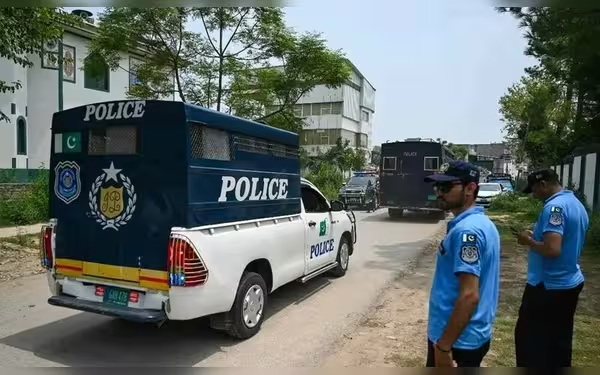Saturday, October 5, 2024 10:29 PM
Terrorism Case Filed Against PTI Leaders Gohar Khan and Salman Raja
- Terrorism case registered against PTI leaders Gohar and Salman.
- Protest outside Supreme Court led to serious legal repercussions.
- Charges include violations of Anti-Terrorism Act and Public Order Act.
 Image Credits: brecorder
Image Credits: brecorderA terrorism case has been filed against PTI leaders Gohar Khan and Salman Raja following a protest outside the Supreme Court.
In a significant development in Pakistan's political landscape, the capital police have registered a terrorism case against prominent leaders of the Pakistan Tehreek-e-Insaf (PTI) party. This action comes in the wake of a protest that took place outside the Supreme Court, where PTI chairman Barrister Gohar Khan and secretary general advocate Salman Akram Raja, along with other party members and supporters, gathered to express their dissent.
The protest, which occurred on Thursday, saw a large group of over 120 individuals carrying PTI flags. They blocked roads and chanted slogans against the judiciary, actions that have now led to serious legal repercussions. The FIR, filed at the Secretariat police station, cites multiple sections of the law, including Section 7 of the Anti-Terrorism Act (ATA) and various sections of the Pakistan Penal Code (PPC). The charges also reference the Peaceful Assembly and Public Order Act, 2024, highlighting the legal framework under which the protest was deemed unlawful.
According to the FIR, the protesters not only obstructed government affairs but also engaged in acts of vandalism, such as burning tyres and an effigy representing the head of a government institution. This behavior is particularly concerning given the imposition of Section 144 in the capital, which prohibits gatherings and rallies. The authorities have taken a firm stance, indicating that such actions will not be tolerated, especially in a climate where public order is paramount.
The implications of this case extend beyond the individuals directly involved. It raises questions about the right to protest in Pakistan and the balance between civil liberties and maintaining public order. While the right to assemble and express dissent is a fundamental aspect of democracy, the government must also ensure that such expressions do not escalate into violence or disrupt societal peace.
As the situation unfolds, it is crucial for citizens to reflect on the importance of lawful protest and the responsibilities that come with it. Engaging in peaceful demonstrations is a vital part of a democratic society, but it must be done within the framework of the law to avoid severe consequences. The ongoing developments in this case will likely serve as a precedent for future protests and the government's response to political dissent.













